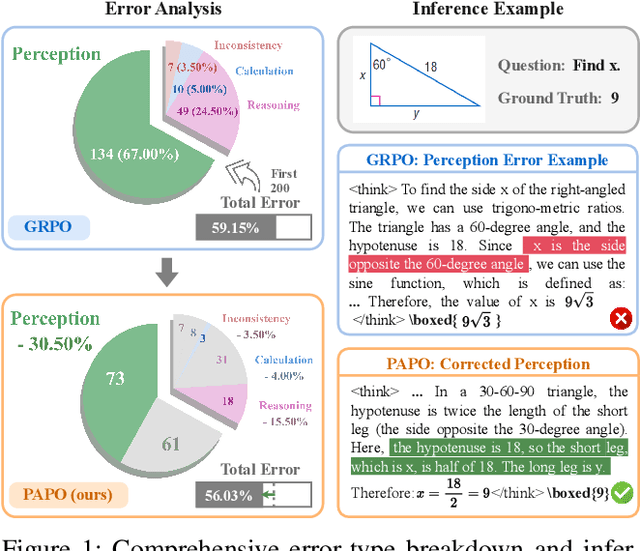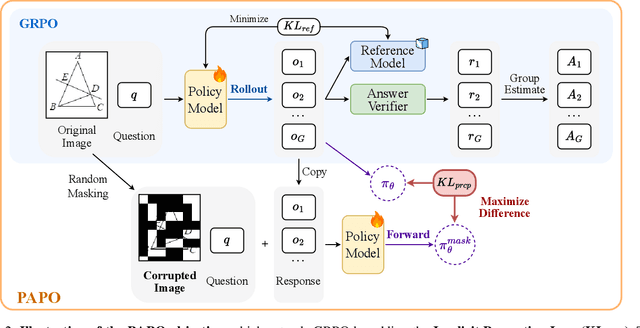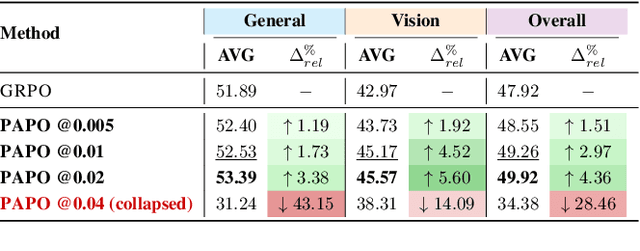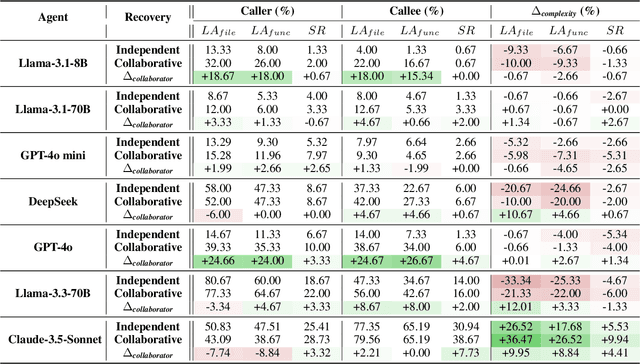Xuehang Guo
Perception-Aware Policy Optimization for Multimodal Reasoning
Jul 08, 2025



Abstract:Reinforcement Learning with Verifiable Rewards (RLVR) has proven to be a highly effective strategy for endowing Large Language Models (LLMs) with robust multi-step reasoning abilities. However, its design and optimizations remain tailored to purely textual domains, resulting in suboptimal performance when applied to multimodal reasoning tasks. In particular, we observe that a major source of error in current multimodal reasoning lies in the perception of visual inputs. To address this bottleneck, we propose Perception-Aware Policy Optimization (PAPO), a simple yet effective extension of GRPO that encourages the model to learn to perceive while learning to reason, entirely from internal supervision signals. Notably, PAPO does not rely on additional data curation, external reward models, or proprietary models. Specifically, we introduce the Implicit Perception Loss in the form of a KL divergence term to the GRPO objective, which, despite its simplicity, yields significant overall improvements (4.4%) on diverse multimodal benchmarks. The improvements are more pronounced, approaching 8.0%, on tasks with high vision dependency. We also observe a substantial reduction (30.5%) in perception errors, indicating improved perceptual capabilities with PAPO. We conduct comprehensive analysis of PAPO and identify a unique loss hacking issue, which we rigorously analyze and mitigate through a Double Entropy Loss. Overall, our work introduces a deeper integration of perception-aware supervision into RLVR learning objectives and lays the groundwork for a new RL framework that encourages visually grounded reasoning. Project page: https://mikewangwzhl.github.io/PAPO.
SyncMind: Measuring Agent Out-of-Sync Recovery in Collaborative Software Engineering
Feb 10, 2025



Abstract:Software engineering (SE) is increasingly collaborative, with developers working together on shared complex codebases. Effective collaboration in shared environments requires participants -- whether humans or AI agents -- to stay on the same page as their environment evolves. When a collaborator's understanding diverges from the current state -- what we term the out-of-sync challenge -- the collaborator's actions may fail, leading to integration issues. In this work, we introduce SyncMind, a framework that systematically defines the out-of-sync problem faced by large language model (LLM) agents in collaborative software engineering (CSE). Based on SyncMind, we create SyncBench, a benchmark featuring 24,332 instances of agent out-of-sync scenarios in real-world CSE derived from 21 popular GitHub repositories with executable verification tests. Experiments on SyncBench uncover critical insights into existing LLM agents' capabilities and limitations. Besides substantial performance gaps among agents (from Llama-3.1 agent <= 3.33% to Claude-3.5-Sonnet >= 28.18%), their consistently low collaboration willingness (<= 4.86%) suggests fundamental limitations of existing LLM in CSE. However, when collaboration occurs, it positively correlates with out-of-sync recovery success. Minimal performance differences in agents' resource-aware out-of-sync recoveries further reveal their significant lack of resource awareness and adaptability, shedding light on future resource-efficient collaborative systems. Code and data are openly available on our project website: https://xhguo7.github.io/SyncMind/.
EdgeQAT: Entropy and Distribution Guided Quantization-Aware Training for the Acceleration of Lightweight LLMs on the Edge
Feb 16, 2024



Abstract:Despite the remarkable strides of Large Language Models (LLMs) in various fields, the wide applications of LLMs on edge devices are limited due to their massive parameters and computations. To address this, quantization is commonly adopted to generate lightweight LLMs with efficient computations and fast inference. However, Post-Training Quantization (PTQ) methods dramatically degrade in quality when quantizing weights, activations, and KV cache together to below 8 bits. Besides, many Quantization-Aware Training (QAT) works quantize model weights, leaving the activations untouched, which do not fully exploit the potential of quantization for inference acceleration on the edge. In this paper, we propose EdgeQAT, the Entropy and Distribution Guided QAT for the optimization of lightweight LLMs to achieve inference acceleration on Edge devices. We first identify that the performance drop of quantization primarily stems from the information distortion in quantized attention maps, demonstrated by the different distributions in quantized query and key of the self-attention mechanism. Then, the entropy and distribution guided QAT is proposed to mitigate the information distortion. Moreover, we design a token importance-aware adaptive method to dynamically quantize the tokens with different bit widths for further optimization and acceleration. Our extensive experiments verify the substantial improvements with our framework across various datasets. Furthermore, we achieve an on-device speedup of up to 2.37x compared with its FP16 counterparts across multiple edge devices, signaling a groundbreaking advancement.
 Add to Chrome
Add to Chrome Add to Firefox
Add to Firefox Add to Edge
Add to Edge